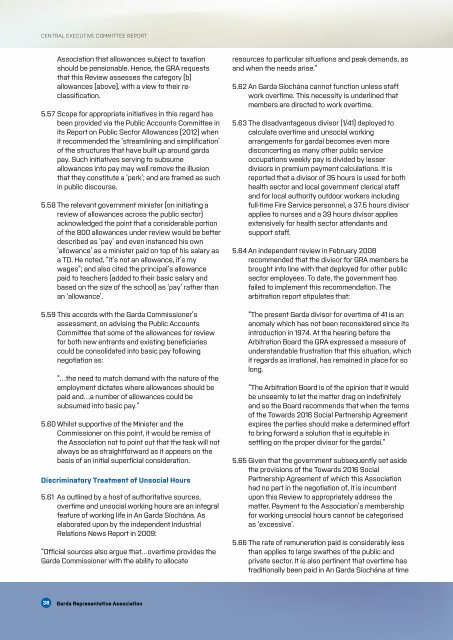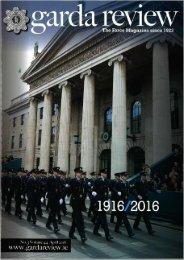Conference Report 2016
Table of contents contains links on page 5. It can be used to skip through chapters.
Table of contents contains links on page 5. It can be used to skip through chapters.
Create successful ePaper yourself
Turn your PDF publications into a flip-book with our unique Google optimized e-Paper software.
CENTRAL EXECUTIVE COMMITTEE REPORT<br />
Association that allowances subject to taxation<br />
should be pensionable. Hence, the GRA requests<br />
that this Review assesses the category (b)<br />
allowances (above), with a view to their reclassification.<br />
5.57 Scope for appropriate initiatives in this regard has<br />
been provided via the Public Accounts Committee in<br />
its <strong>Report</strong> on Public Sector Allowances (2012) when<br />
it recommended the ‘streamlining and simplification’<br />
of the structures that have built up around garda<br />
pay. Such initiatives serving to subsume<br />
allowances into pay may well remove the illusion<br />
that they constitute a ‘perk’; and are framed as such<br />
in public discourse.<br />
5.58 The relevant government minister (on initiating a<br />
review of allowances across the public sector)<br />
acknowledged the point that a considerable portion<br />
of the 800 allowances under review would be better<br />
described as ‘pay’ and even instanced his own<br />
‘allowance’ as a minister paid on top of his salary as<br />
a TD. He noted, “it’s not an allowance, it’s my<br />
wages”; and also cited the principal’s allowance<br />
paid to teachers (added to their basic salary and<br />
based on the size of the school) as ‘pay’ rather than<br />
an ‘allowance’.<br />
5.59 This accords with the Garda Commissioner’s<br />
assessment, on advising the Public Accounts<br />
Committee that some of the allowances for review<br />
for both new entrants and existing beneficiaries<br />
could be consolidated into basic pay following<br />
negotiation as:<br />
“…the need to match demand with the nature of the<br />
employment dictates where allowances should be<br />
paid and…a number of allowances could be<br />
subsumed into basic pay.”<br />
5.60 Whilst supportive of the Minister and the<br />
Commissioner on this point, it would be remiss of<br />
the Association not to point out that the task will not<br />
always be as straightforward as it appears on the<br />
basis of an initial superficial consideration.<br />
Discriminatory Treatment of unsocial hours<br />
5.61 As outlined by a host of authoritative sources,<br />
overtime and unsocial working hours are an integral<br />
feature of working life in An Garda Síochána. As<br />
elaborated upon by the independent Industrial<br />
Relations News <strong>Report</strong> in 2009:<br />
“Official sources also argue that…overtime provides the<br />
Garda Commissioner with the ability to allocate<br />
resources to particular situations and peak demands, as<br />
and when the needs arise.”<br />
5.62 An Garda Síochána cannot function unless staff<br />
work overtime. This necessity is underlined that<br />
members are directed to work overtime.<br />
5.63 The disadvantageous divisor (1/41) deployed to<br />
calculate overtime and unsocial working<br />
arrangements for gardaí becomes even more<br />
disconcerting as many other public service<br />
occupations weekly pay is divided by lesser<br />
divisors in premium payment calculations. It is<br />
reported that a divisor of 35 hours is used for both<br />
health sector and local government clerical staff<br />
and for local authority outdoor workers including<br />
full-time Fire Service personnel, a 37.5 hours divisor<br />
applies to nurses and a 39 hours divisor applies<br />
extensively for health sector attendants and<br />
support staff.<br />
5.64 An independent review in February 2008<br />
recommended that the divisor for GRA members be<br />
brought into line with that deployed for other public<br />
sector employees. To date, the government has<br />
failed to implement this recommendation. The<br />
arbitration report stipulates that:<br />
“The present Garda divisor for overtime of 41 is an<br />
anomaly which has not been reconsidered since its<br />
introduction in 1974. At the hearing before the<br />
Arbitration Board the GRA expressed a measure of<br />
understandable frustration that this situation, which<br />
it regards as irrational, has remained in place for so<br />
long.<br />
“The Arbitration Board is of the opinion that it would<br />
be unseemly to let the matter drag on indefinitely<br />
and so the Board recommends that when the terms<br />
of the Towards <strong>2016</strong> Social Partnership Agreement<br />
expires the parties should make a determined effort<br />
to bring forward a solution that is equitable in<br />
settling on the proper divisor for the gardaí.”<br />
5.65 Given that the government subsequently set aside<br />
the provisions of the Towards <strong>2016</strong> Social<br />
Partnership Agreement of which this Association<br />
had no part in the negotiation of, it is incumbent<br />
upon this Review to appropriately address the<br />
matter. Payment to the Association’s membership<br />
for working unsocial hours cannot be categorised<br />
as ‘excessive’.<br />
5.66 The rate of remuneration paid is considerably less<br />
than applies to large swathes of the public and<br />
private sector. It is also pertinent that overtime has<br />
traditionally been paid in An Garda Síochána at time<br />
38 Garda Representative Association




